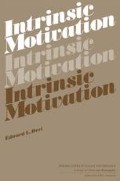Abstract
In 1957, Festinger proposed a theory of cognitive dissonance which has probably generated more research than any other theory in social psychology. Briefly, cognitive dissonance theory asserts that if a person holds two cognitions which are discrepant, he will experience discomfort and be motivated to do something which will reduce the dissonance.
Access this chapter
Tax calculation will be finalised at checkout
Purchases are for personal use only
Preview
Unable to display preview. Download preview PDF.
Author information
Authors and Affiliations
Rights and permissions
Copyright information
© 1975 Plenum Press, New York
About this chapter
Cite this chapter
Deci, E.L. (1975). Cognitive Dissonance Theory: Effects of Insufficient Justification on Intrinsic Motivation. In: Intrinsic Motivation. Springer, Boston, MA. https://doi.org/10.1007/978-1-4613-4446-9_6
Download citation
DOI: https://doi.org/10.1007/978-1-4613-4446-9_6
Publisher Name: Springer, Boston, MA
Print ISBN: 978-1-4613-4448-3
Online ISBN: 978-1-4613-4446-9
eBook Packages: Springer Book Archive

